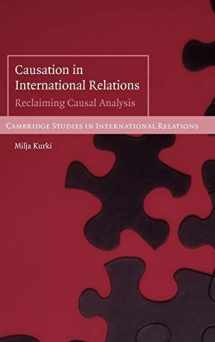
Causation in International Relations: Reclaiming Causal Analysis (Cambridge Studies in International Relations, Series Number 108)
ISBN-13:
9780521882972
ISBN-10:
0521882974
Edition:
1
Author:
Milja Kurki
Publication date:
2008
Publisher:
Cambridge University Press
Format:
Hardcover
370 pages
Category:
International & World Politics
,
Politics & Government
FREE US shipping
Book details
ISBN-13:
9780521882972
ISBN-10:
0521882974
Edition:
1
Author:
Milja Kurki
Publication date:
2008
Publisher:
Cambridge University Press
Format:
Hardcover
370 pages
Category:
International & World Politics
,
Politics & Government
Summary
Causation in International Relations: Reclaiming Causal Analysis (Cambridge Studies in International Relations, Series Number 108) (ISBN-13: 9780521882972 and ISBN-10: 0521882974), written by authors
Milja Kurki, was published by Cambridge University Press in 2008.
With an overall rating of 4.4 stars, it's a notable title among other
International & World Politics
(Politics & Government) books. You can easily purchase or rent Causation in International Relations: Reclaiming Causal Analysis (Cambridge Studies in International Relations, Series Number 108) (Hardcover) from BooksRun,
along with many other new and used
International & World Politics
books
and textbooks.
And, if you're looking to sell your copy, our current buyback offer is $0.3.
Description
World political processes, such as wars and globalisation, are engendered by complex sets of causes and conditions. Although the idea of causation is fundamental to the field of International Relations, what the concept of cause means or entails has remained an unresolved and contested matter. In recent decades ferocious debates have surrounded the idea of causal analysis, some scholars even questioning the legitimacy of applying the notion of cause in the study of International Relations. This book suggests that underlying the debates on causation in the field of International Relations is a set of problematic assumptions (deterministic, mechanistic and empiricist) and that we should reclaim causal analysis from the dominant discourse of causation. Milja Kurki argues that reinterpreting the meaning, aims and methods of social scientific causal analysis opens up multi-causal and methodologically pluralist avenues for future International Relations scholarship.


We would LOVE it if you could help us and other readers by reviewing the book
Book review

Congratulations! We have received your book review.
{user}
{createdAt}
by {truncated_author}


